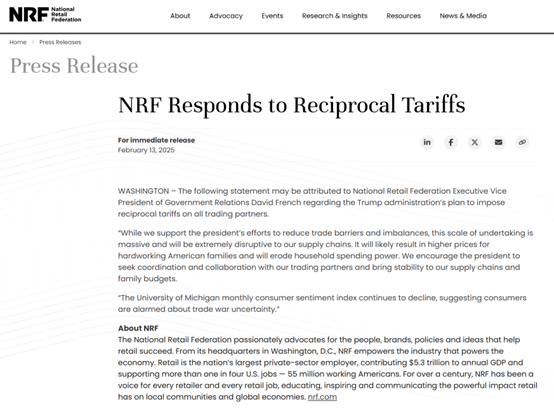① On Thursday local time, U.S. President Trump signed a memorandum requiring relevant departments to determine “reciprocal tariffs” with each foreign trading partner;
② In response, the National Retail Federation (NRF) warned that higher prices will soon hit Americans.
Cailian News, February 14 (Editor Bian Chun)On Thursday local time, U.S. President Trump signed a memorandum requiring relevant departments to determine “reciprocal tariffs” with each foreign trading partner. In response, the National Retail Federation (NRF) warned thatHigher prices will soon hit Americans。
“While we support the president’s efforts to reduce trade barriers and imbalances, the scale of this action is huge andWill cause great damage to our supply chain。”David French, executive vice president of government relations at NRF, said in a statement.
“This could expose hard-working American families to higher prices and weaken their spending power。”He said. “We encourage the president to seek coordination and cooperation with our trading partners to bring stability to our supply chains and household budgets.”
French also pointed out that consumers are worried about an economic war. “The University of Michigan’s monthly consumer confidence index continues to decline, indicating consumers are concerned about the uncertainty of the trade war.” He said.

On Thursday, Trump signed a presidential memorandum proposing “reciprocal tariffs.” He said it would combat unfair or discriminatory tariffs from allies and rival countries.
The “reciprocal tariffs” will be customized for each trading partner based on five different aspects. The “reciprocal tariffs” will not take effect immediately, but the signing of the memorandum marks that the government will initiate a review process to pave the way for the implementation of tariffs.
Trump signed a document on the 10th, announcing a 25% tariff on all U.S. imports of steel and aluminum, and claimed that so-called “reciprocal tariffs” would be imposed on chips, automobiles, medicines and other products.
U.S. allies such as Canada, Germany, and Japan opposed this, believing that the above tariff measures would undermine the multilateral trading system and hinder world economic development, and that both the United States and its trading partners would suffer huge losses as a result.
Economists and some Democrats have also criticized Trump’s tariff plan, arguing that it will increase the daily cost of living for Americans and plunge the United States into a trade war with opponents. They also pointed out that this would curb corporate investment and could cause the Fed to delay further interest rate cuts.
Despite facing criticism from many parties, the Trump administration is still determined to advance its tariff plan. Trump said earlier this month that Americans might feel economic “pain” because of the tariffs he imposed on important trading partners, but claimed that “the price is worth the price” to ensure U.S. interests.



